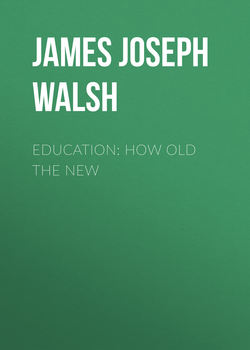Читать книгу Education: How Old The New - James Joseph Walsh - Страница 2
PREFACE
ОглавлениеThe reason for publishing this volume of lectures and addresses is the persuasion that present-day educators are viewing the history of education with short-sighted vision. An impression prevails that only the last few generations have done work of serious significance in education. The history of old-time education is neglected, or is treated as of at most antiquarian interest and there is a failure to understand its true value. The connecting link between the lectures and addresses is the effort to express in terms of the present what educators were doing in the past. Once upon a time, when I proclaimed the happiness of the English workmen of the Middle Ages, the very positive objection was raised, "How could they be happy since their wages were only a few cents a day?" For response it was only necessary to point out that for his eight cents, the minimum wage by act of Parliament, the workman could buy a pair of handmade shoes, that being the maximum price established by law, and other necessaries at similar prices. If old-time education is studied with this same care to translate its meaning into modern values, then the very oldest education of which we have any record takes on significance even for our time.
While it is generally supposed that there are many new features in modern education, it requires but slight familiarity with educational history to know that there is very little that is novel. Such supposedly new phases as nature-study and technical training and science, physical as well as ethical, are all old stories, though they have had negative phases during which it would be hard to to trace them. The more we know about the history of education the greater is our respect for educators at all times. Nearly always they had a perfectly clear idea of what they were trying to do, they faced the problems of education in quite the same spirit that we do and often solved them very well. Indeed the results of many periods of old-time education are much better than our own, even when judged by our standards.
Unfortunately there exists a very common persuasion that evolution plays a large role in education and that we, "the heirs of all the ages in the foremost files of time," are necessarily in the forefront of educational advance. There has been much progress in education in the last century, but it would, indeed, be a hopeless world if there had not been progress out of the depths in which education was plunged in the eighteenth century. There were a number of reformers in education at the end of the eighteenth and the beginning of the nineteenth century. It was rather easy to be an educational reformer at that time. The lowest period in the history of education was about the middle of the eighteenth century. It has been assumed that since we are far ahead of that generation we must be still farther ahead of the people who preceded them. That is the mistake. There are periods of education of very great significance centuries long before that time.
In educational lectures and addresses for the past five years, I have been trying to translate into modern terms the meaning of these old periods of education. A great many teachers have thought the ideas valuable and suggestive and so I am tempted to publish them in book form. There is an additional reason, that of wishing to create a bond of sympathy between the two systems of education that have grown up in this country. For some three generations now Catholic educators have been independently building up a system of education from the elementary schools to the university. The American world of education is coming to recognize how much they have accomplished. There has even been some curiosity expressed as to how it was all done in spite of apparently insuperable obstacles. One phase of Catholic education, its thorough-going conservatism and definite effort to value the past properly and take advantage of its precious lessons, is here represented.
My own educational interests have been taken up much more of late years with medicine than with other phases of this subject. Hence the volume contains certain addresses relating to the history of medical education. They are more intimately linked with the general subject of education than might perhaps be thought. We have had finely organized medical education at a number of times in the past, and, indeed, at the present moment can find inspiration and incentive in studying the legal regulation of medicine and of medical education in what might seem to be so-unpromising a time as the thirteenth century. For true educational progress there has always been need of close sympathy between the non-professional and the professional department of universities. Only when the professional schools are real graduate departments, requiring under-graduate training for admission, is the university doing its work properly. This was the rule in the past–hence the precious lessons for the present in the story of these old-time universities.
These lectures and addresses were actually delivered, not merely read. They were written with that purpose. Certain repetitions that would have been avoided if the articles had been prepared directly for reading and not for an audience, may be noted. Some of the subjects overlap and certain phases had to be treated usually in variant form in different lectures. For these faults the reader's indulgence is craved.
